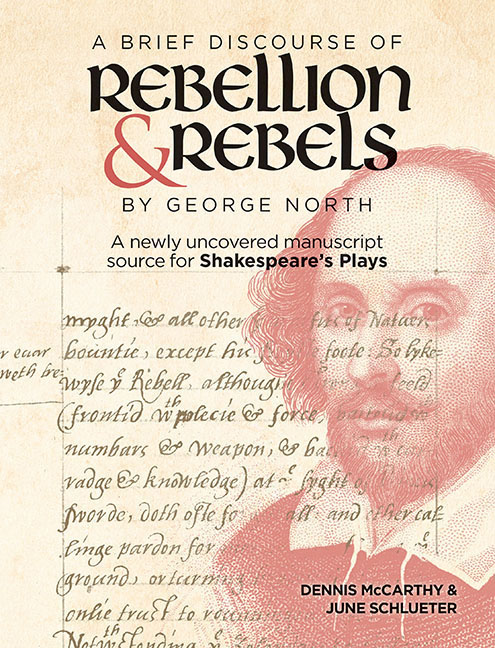 'A Brief Discourse of Rebellion and Rebels' by George North
'A Brief Discourse of Rebellion and Rebels' by George North Published online by Cambridge University Press: 09 October 2019
Given the extent of influence the George North manuscript had on the Shakespeare canon, its size is relevant. At 13,000 words, “Discourse” is shorter than Shakespeare's shortest play, The Comedy of Errors (14,369 words), but it is densely packed with pre-Shakespearean passages, events, and themes, with numerous subjects that are represented in the canon. Indeed, the impact of “Discourse” exceeds that of most other known sources. Recall Kenneth Muir's focus on the use of the single word insculpt in the casket scene in The Merchant of Venice and his linking it to Robinson's translation of Gesta Romanorum (1577); compare this with the extensive correspondences between the Shakespeare canon and “Discourse,” which include dozens of parallel passages, offered in the same context and sharing multiple words, phrases, and word groupings that were not merely unusual for Shakespeare but unique in the EEBO database. In Poor Tom's reciting of a canine hierarchy (trundle-tail, mastie(ff), greyhound, spaniel, cur(rish), dog), words are not strewn about but appear, as in “Discourse,” in analogous tetrameter stanzas, making the same unusual point about hierarchies. Moreover, EEBO confirms that trundle tail was not only rare for Shakespeare but rare for everyone else as well, appearing in only one other work prior to the publication of the First Folio (1623). When we expand our focus to the rest of Jack Cade's poem in “Discourse,” we find traitors all, rebel like, pight, and flesh and fell – all phrases and terms that reappear in King Lear (5.3.274, 4.3.14, 2.1.64, 5.3.24). Indeed, Shakespeare is the only writer to use flesh and fell in the searchable EEBO texts of the seventeenth century. Other scholars have concluded that Jack Cade was the model for Poor Tom; hence the conclusion that North's description helped the playwright create Edgar's alter-ego is inescapable. Indeed, on the same page as the beginning of Cade's poem, we also find North's description of the suffering Glendower, who must “… feed on … / … mire and filthy mud: / And in the end to eat my dung / my flesh and eke my blood” (fol. 46). Again, we immediately think of the starving, filthy, dung-eating Poor Tom of the quagmire, whose flesh and blood …
To save this book to your Kindle, first ensure no-reply@cambridge.org is added to your Approved Personal Document E-mail List under your Personal Document Settings on the Manage Your Content and Devices page of your Amazon account. Then enter the ‘name’ part of your Kindle email address below. Find out more about saving to your Kindle.
Note you can select to save to either the @free.kindle.com or @kindle.com variations. ‘@free.kindle.com’ emails are free but can only be saved to your device when it is connected to wi-fi. ‘@kindle.com’ emails can be delivered even when you are not connected to wi-fi, but note that service fees apply.
Find out more about the Kindle Personal Document Service.
To save content items to your account, please confirm that you agree to abide by our usage policies. If this is the first time you use this feature, you will be asked to authorise Cambridge Core to connect with your account. Find out more about saving content to Dropbox.
To save content items to your account, please confirm that you agree to abide by our usage policies. If this is the first time you use this feature, you will be asked to authorise Cambridge Core to connect with your account. Find out more about saving content to Google Drive.